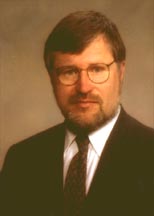A Smithsonian-backed editor is defrocked by the priesthood of science for publishing an article on Intelligent Design
Science is typically praised as open-ended and free, pursuing the evidence wherever it leads. Scientific conclusions are falsifiable, open to further inquiry, and revised as new data emerge. Science is free of dogma, intolerance, censorship, and persecution.
By these standards, Darwinists have become the dogmatists. Scientists at the Smithsonian Institute, supported by American taxpayers, are punishing one of their own simply for publishing an article about Intelligent Design.
Stephen Meyer, who holds a Ph.D. from Cambridge and is a research fellow at the Discovery Institute, wrote an article titled "The Origin of Biological Information and the Higher Taxonomic Categories." As Mr. Meyer explained it to WORLD, his article deals with the so-called Cambrian explosion, that point in the fossil record in which dozens of distinct animal body forms suddenly spring into existence. Darwinists themselves, he showed through a survey of the literature, admit that they cannot explain this sudden diversity of form in so little time.
Mr. Meyer argued that the need for new proteins, new genetic codes, new cell structures, new organs, and new species requires specific "biological information." And "information invariably arises from conscious rational activity." That flies in the face of the Darwinist assumption that biological origins are random.
Mr. Meyer submitted his paper to the Proceedings of the Biological Society of Washington, a scientific journal affiliated with the Smithsonian Institute's National Museum of Natural History. The editor, Rick Sternberg, a researcher at the museum with two Ph.D.s in biology, forwarded the article to a panel of three peer reviewers. In scientific and other academic scholarship, submitting research to the judgment of other experts in the field ensures that published articles have genuine merit. Each of the reviewers recommended that, with revisions, the article should be published. Mr. Meyer made the revisions and the article was published last August.
Whereupon major academic publications—Science, Nature, Chronicles of Higher Education—expressed outrage. The anger was focused not on the substance of the article, but on the mere fact that a peer-reviewed scientific journal would print such an article.
So the wrath of the Darwinists fell on Mr. Sternberg, the editor. Although he had stepped down from the editorship, his supervisors at the Smithsonian took away his office, made him turn in his keys, and cut him off from access to the collections he needs for his research. He is also being subjected to the sectarian religious discipline of "shunning." His colleagues are refusing to talk to him or even greet him in the hallways.
His supervisors also staged an inquisition about Mr. Sternberg's religious and even political beliefs. Mr. Sternberg, who describes himself as a Catholic with lots of questions, has filed a case alleging discrimination not just on the grounds of religion but "perceived" religion.
Critics of Mr. Sternberg say that the article should not have been published because the American Association for the Advancement of Science has proclaimed that Intelligent Design is "unscientific by definition." As Mr. Meyer points out: "Rather than critique the paper on its scientific merits, they appeal to a doctrinal statement."
Historically, said Mr. Meyer, science has sought "the best explanation, period, wherever the evidence leads." But now the scientific establishment is requiring something else: "the best materialistic explanation for phenomenon." That rules out non-materialistic explanations from the onset, demanding adherence to the worldview that presumes the material realm is all that exists.
David Klinghoffer broke the story of Mr. Sternberg's mistreatment in The Wall Street Journal. The attempts to discredit him, Mr. Meyer said, have resulted in hundreds of scientists from around the world requesting and downloading the paper (available from www.discovery.org/csc/).
Mr. Meyer said that many scientists secretly agree with elements of Intelligent Design but are afraid to go public. Critics tried to force Mr. Sternberg to reveal the names of the peer reviewers—which are supposed to remain anonymous—but he refused. Darwinists shifted the discussions to evolution as a worldview, while avoiding its admitted failures to account for what Darwin purported to explain, namely, the origin of species.
The virulence of the attempts to suppress Intelligent Design demonstrates the Darwinists' insecurity. "You don't resort to authoritarianism," observed Mr. Meyer, "if you can answer it."
